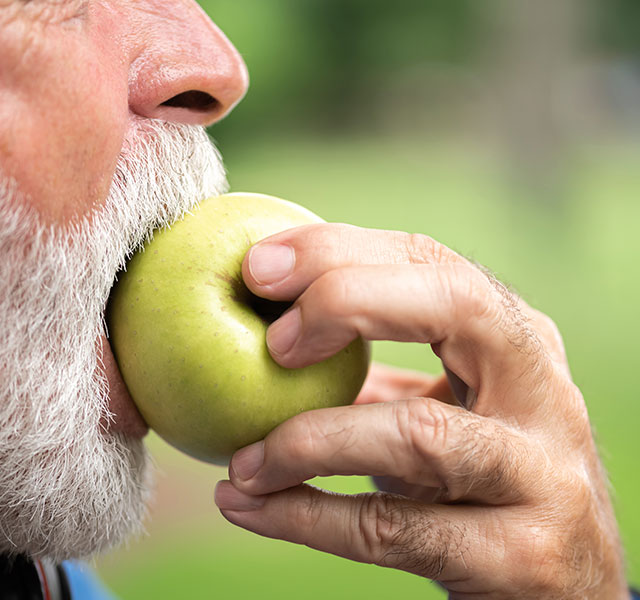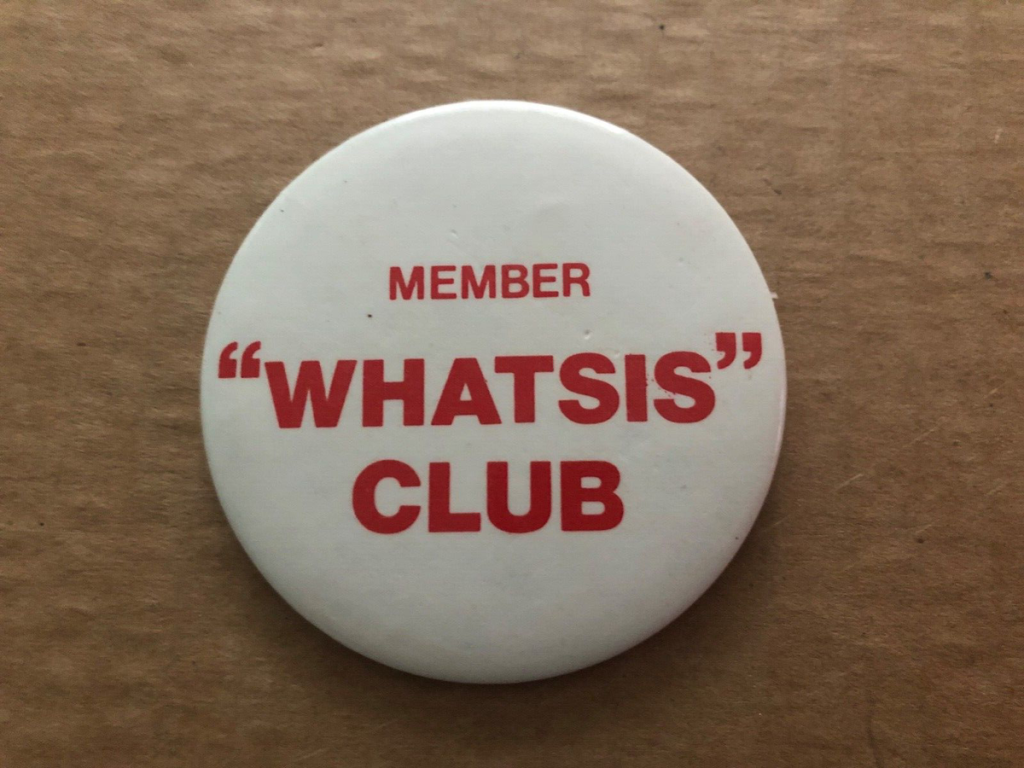Whenever real estate agent Nancy Watkins, 65, considers listing a home, she always brings along a colleague for the first visit. Because if the house is stinky—a big turnoff for prospective buyers—she can’t tell.
Watkins (not her real name) has been gradually losing her sense of smell, and in recent years it’s become a problem. “It makes my job tricky if I can’t tell whether a property has pet odors or smoke odors,” she said.
She’s not alone. Losing the ability to taste and smell is a distressingly common issue for older adults, according to Brian Lin, PhD, research assistant professor of development, molecular and chemical biology at Tufts University School of Medicine.
Nearly one in four Americans over 40 reports some impairment in their ability to smell; among those over 80, some studies suggest the percentage could be as high as 75 percent.
Almost one in five Americans over the age of 40 reports some alteration in their sense of taste; about a quarter of those over 80 are affected.
Medical providers tend to focus more on problems like hearing loss than they do on changes in taste and smell.
Diminished taste (hypogeusia) and smell (hyposmia) aren’t just annoyances; they can affect health, happiness and safety, according to Savana Howe, PhD, a licensed clinical psychologist.
“Imagine sitting down to your favorite meal, only to realize it tastes bland or has no flavor at all,” she said. “For many older adults, this is a daily reality.”
In contrast to vision and hearing loss, medical providers are less likely to pay attention to changes in taste and smell. But sensory loss can lead to significant problems, ranging from poor nutrition and unhealthy weight loss to loneliness, depression and social isolation—even to increased risk of death or injury, due to the inability to sniff out threats like a fire or a gas leak.
Causes of Diminished Taste and Smell
Some decline in taste and smell is a normal part of aging, particularly after 60. The cause of this decline is not well understood, but researchers believe the changes stem from deterioration in the brain as well as in the sensory receptors in the nose and mouth.
Complicating the picture: the loss of taste and smell aren’t always easily distinguished.
“Much of what we call taste or ‘flavor’ is actually a combination of smell and taste,” Lin explained. “In some cases, one sense is affected; in others, both are impaired.”
Often, it’s the smell, not the taste, that leads us to appreciate subtle variations in the flavors of wine, coffee or foods like pasta sauce.
“Our noses have amazing abilities,” said Madeleine Samuelson Herman, MD, physician and president of Sinus Center & ENT Specialists of Houston. “There’s an area of just 5 cm, located at the top of our noses, with millions of smell neurons that can detect trillions of different scents.”
Some people over age 40 report phantom smells—they catch whiffs of odors that aren’t there.
Taste depends on taste buds and nerves that transmit signals to the brain. By age 50, the number of taste buds begins to decline. Anything that damages these parts or interferes with how they work together can potentially lead to loss of taste, ranging from ageusia (a complete loss of the ability to taste) to hypogeusia (a decreased sense of taste) or dysgeusia (a distorted, unpleasant perception of taste).
Olfactory neurons die on a regular basis. As we age, the stem cells that help regenerate them stop replacing the neurons as regularly. As a result, the sense of smell fades. When olfactory function declines, older adults not only lose the ability to detect odors but also to discriminate between smells. About one in 15 Americans over age 40 experiences phantom smells—the perception of odors that aren’t there.
Olfactory function seems to be a potent indicator of overall health and well-being. A growing body of evidence links loss of smell with increased risk of frailty, mortality and cognitive decline. One paper found that olfactory dysfunction predicted five-year mortality better than many other common metrics. Some researchers propose that, with further study, screening older adults’ ability to smell various scents could become as important as testing hearing and vision.
An Emotional Sense
The sense of smell is closely tied to the limbic system in the brain, which controls emotions. That’s why a familiar scent—freshly baked cookies, for instance—can trigger nostalgia or other emotions. Losing this sense can have profound psychological effects. One study linked loss of smell to an increased risk of depression among older adults. Those with a poorer sense of smell were more likely to report moderate or high depressive symptoms, even after adjusting for age, income and other factors.
Lin experienced the grimness of a scent-free world firsthand after contracting COVID-19, which temporarily destroyed his sense of smell.
“I’m a foodie, so it was distressing,” he said. At first, he treated it as a scientific experiment, eating a variety of foods to analyze his experience. But soon, he lost interest in eating altogether and dropped 10 pounds. When his sense of smell returned, so did his appetite.
Losing a few pounds may be a bonus for younger people. For older adults, decreased appetite due to loss of smell or taste can lead to unhealthy weight loss, muscle weakness and fatigue, which can increase the risk of falls and illness. Some older adults may eat poorly, adding excessive salt or sugar to food to compensate for the lack of taste or smell, and thereby worsening conditions like high blood pressure and diabetes.
Medical Evaluation
Loss of taste and smell should always be evaluated by a health care provider, who may find treatable underlying causes.
“As an ENT, I encounter patients of all ages with smell and taste loss almost daily,” said Herman. “For most, it’s due to poor nasal breathing. It’s my job to figure out why that is. There are many points in the nasal passage that can be blocked: the nostrils, the septum, the turbinates and the adenoids. You can have polyps, masses or swelling, any of which affect nasal breathing and lead to a poor sense of smell.”
Loss of smell and taste could also be simply due to age, she added, “But we always want to rule out the scary stuff, like tumors, and treat what we can, such as stuffy noses.”
Other common causes of smell or taste loss among Herman’s patients are viral or bacterial infection (including COVID-19), trauma, neurologic disease (such as Parkinson’s or Alzheimer’s), exposure to toxins such as cigarette smoke or heavy metals, chemo and radiation, dry mouth, dental problems, heavy alcohol use, or vitamin or thyroid deficiency.
A medical evaluation for loss of taste and smell should always include a review of the patient’s medications. More than 350 drugs can alter taste, while over 70 affect smell. Common culprits include antibiotics, antihistamines, anti-seizure medications, tricyclic antidepressants, bronchodilators and chemotherapy drugs.
Injury can also trigger a loss of taste or smell. MK Werner’s 85-year-old mother, Marianne, lost her sense of smell after she fell and hit her head. A CT scan and medical evaluation showed no evidence of a concussion or stroke. She remained mostly healthy and cognitively sharp until her death last year at age 97. But her sense of smell never returned.
“My mother was a fabulous cook and an immaculate housekeeper, and the loss really bothered her,” Werner said. “She had to throw away a lot of food, out of an abundance of caution, because she couldn’t sniff it to make sure it was fresh, which was hard for someone who had lived through the Depression. And she worried about cleanliness. She would often say to me, ‘If I ever smell, or the house smells, tell me!’”
Treating the Loss
Doctors often don’t treat the loss of smell or taste as aggressively as vision or hearing loss. For one thing, there are more treatment options for those problems: for example, prescription eyeglasses or cataract surgery for vision loss, or hearing aids for hearing loss. But Herman thinks that the medical community is paying more attention to loss of smell after COVID-19 because so many people experienced that as a side effect. And some treatment options are emerging for age-related or infection-related loss of smell.
“Some patients benefit from smell-retraining therapy,” said Herman. Also known as “olfactory training,” this therapy involves four bottles or jars containing an odor solution soaked into cotton pads, typically phenylethyl alcohol (rose scent), eucalyptol (eucalyptus scent), citronella (lemon scent) and eugenol (clove scent). Patients sniff each of the four scents separately for at least 20 to 30 seconds twice daily.
“It’s not a cure-all, but you’re basically ‘exercising’ the nerves in a way that seems to help them regrow and heal,” Herman said.
Researchers on Lin’s team at Tufts have patented an approach that may one day help restore smell by switching off a particular gene and signaling stem cells to recreate olfactory tissue. So far, the treatment has worked in animals and in human cultures in the lab.
Currently, however, most cases of age-related loss of taste or smell are managed rather than treated. Strategies might include safety measures like making sure the home has smoke and carbon monoxide detectors. Lifestyle changes can also help. Quitting smoking can restore taste in as little as 48 hours. Improving oral hygiene can enhance taste perception. Supplements could also be helpful, as deficiencies of vitamin B12 and zinc are linked to the loss of taste and smell.
Addressing the Loss
Whenever she visited her 95-year-old grandmother, Michelle Rauch made it a habit to clean out the fridge. Because her sense of taste and smell were diminished, her grandmother couldn’t tell when milk had soured or if food had gone bad.
“We were worried she would get food poisoning,” Rauch recalled.
Her grandmother died at age 102, but Rauch now works with many residents similarly affected by loss of taste and smell as a registered dietician at Actors Fund Home, a senior living community in Englewood, NJ, for retired members of the entertainment community.
Rauch worries that the loss of taste and smell can lead to isolation. Meals are the highlight of the day for many residents of senior living communities; many spend most of their time in their room and come out only for meals. That’s why Rauch organizes “snacktivities”—social events in the community centered around food—to encourage residents to engage more often.
“There’s a social side of eating,” Rauch said. “If eating becomes frustrating or joyless, older adults may skip social gatherings, increasing loneliness and depression.”
Rauch experiments with different foods and food preparation techniques to help keep residents interested in eating. Varying food textures and temperatures can help. Rauch also tries planning visually appealing meals and snacks.
“We eat with our eyes,” she said. “A colorful plate or attractive presentation can help compensate for diminished taste or smell.”
Rauch is also constantly experimenting. She asks residents about their favorite foods. One resident, who had lost interest in eating, spoke fondly of egg creams, a favorite from her childhood in Brooklyn. Rauch recreated the beverage, made with milk, chocolate syrup and seltzer, but substituted a protein drink for the milk to boost nutrition. The woman loved the treat. Her appetite improved, her mood lifted, and she put on some much-needed weight.
“It was like a miracle,” Rauch said.
Know the Signs
Caregivers for older adults should be on the alert for signs of loss of taste and smell, because the change is often gradual and easily overlooked, according to Tanner Gish, director of operations for Loving Homecare, Inc., an in-home caregiving provider.
He recalled a client, a woman in her late 70s, who lost weight. The doctor hadn’t found a cause, but a caregiver noticed that the woman was eating expired food and choosing excessively salted, processed meals, likely to compensate for lack of flavor. Further evaluation revealed that she had lost her sense of smell. Now, caregivers frequently check her fridge and pantry for expired or spoiled foods and prepare her meals with stronger added flavors like spices and citrus.
As for Watkins, she isn’t sure why she began losing her sense of smell several years ago. She theorizes that the dust from kitty litter in her home may have triggered the issue. Her doctor found a narrowing of her nasal passages; surgery might help but there are no guarantees. Watkins is considering the procedure because she worries about the risk.
“I had a gas leak in my home a few years before I lost my ability to smell,” she said. “If I had a gas leak today, I wouldn’t notice it.”

Freelance writer Mary Jacobs lives in Plano, TX, and covers health and fitness, spirituality, and issues relating to older adults. She writes for the Dallas Morning News, the Senior Voice, Religion News Service and other publications; her work has been honored by the Religion Communicators Council, the Associated Church Press and the American Association of Orthopaedic Surgeons. Visit www.MaryJacobs.com for more.



